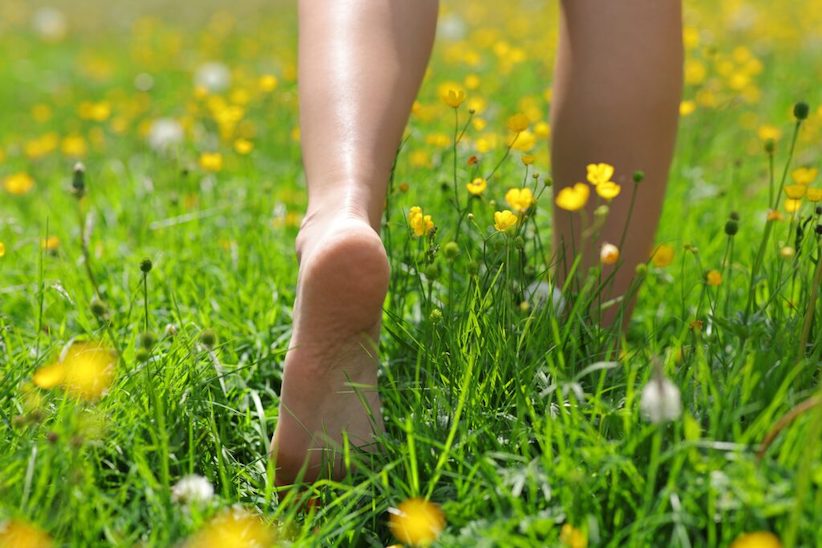Grounding Sheets: Does Channeling Earth’s Energy Help You Sleep Better?

Amidst all the supplements, prescriptions, and gadgets out there that claim to help you get better rest, could the solution to your sleep problems actually be under your feet?
According to the concept of “grounding” or “Earthing,” yes, it could. While the idea of connecting with nature and Earth for healing powers has been around throughout history, this wellness trend is hitting its modern stride thanks to social media, celebrities like Gwyneth Paltrow, and ads for grounding products.
The theory says that when your body makes direct contact with Earth, the planet’s negatively charged electrons connect with the body’s electrical system, leading to an exchange of electrons and neutralizing the acid in the body. The result—so proponents say—is lower inflammation, a better mood, and improved sleep, among other benefits.
For those who can’t dedicate the hours to strolling barefoot through the grass, there are grounding sheets and mats made with conductive materials like carbon, silver, or stainless steel blended with cotton or polyester that plug into the grounded port of an electrical outlet. This allows negatively charged electrons to pass from the earth through the outlet and conductive material to your body when lying or standing on the sheet or mat. This is purported to lead to the same benefits as direct contact with the earth.
But before you hop onto Amazon to get your own grounding sheet or mat, let’s take a look at what the research says. A few recent journal articles reviewed the health benefits of grounding, but studies that examine its effect on sleep are limited.
One small study published in the Journal of Alternative and Complementary Medicine used cortisol levels and self-reporting to determine grounding’s effect on sleep, pain, and stress. Cortisol is produced by our bodies to help us respond to stress by making us feel more alert. Cortisol levels typically follow your circadian rhythms, with levels lowest in the evening when you go to sleep and highest in the morning before you wake. Cortisol helps you wake up and stay awake throughout the day.

After taking a saliva test to determine baseline cortisol levels, the participants slept on a conductive (grounding) mattress pad on their own beds for 8 weeks. They regularly reported on their symptoms of pain and stress, and how well or poorly they slept throughout the study. Cortisol levels were tested again after 6 weeks.
At the end of 8 weeks, participants reported decreased or eliminated pain and stress symptoms as well as improved sleep. The researchers found that cortisol levels had also lowered.
Another small pilot study from 2022 of patients with Alzheimer’s disease used grounding mats to determine effects on health, including sleep quality. In this case, however, the participants did not sleep on a grounding sheet but spent 30 minutes on the mat five times a week for 12 weeks.
The results showed that after 12 weeks, sleep quality, including sleep length, time to fall asleep, and awakenings, improved significantly for the group that used the grounding mat compared to the group that did not. Although the study authors concluded that grounding can be beneficial for sleep quality in patients with dementia, they also noted that further studies with a larger sample size of participants are necessary.
So, while grounding could help reduce aches and pains, improve your outlook, increase energy, and boost your sleep, keep in mind that more robust studies are needed to more fully understand its health benefits.
In the meantime, whether you opt for a barefoot walk in the park or an electronically-focused grounding, a connection with Earth is worth it every time.
Got a hot tip? Pitch us your story idea, share your expertise with SleepFoundation.org, or let us know about your sleep experiences right here.
References
9 Sources
-
The Earthing Institute. (n.d.) A Brief (and Certainly Incomplete) History of Earthing., Retrieved March 21, 2024, from
https://earthinginstitute.net/brief-history-of-earthing/ -
Blackwood, E. (2023, August 21). Can Going Barefoot Improve Your Sleep? Outside Online., Retrieved March 21, 2024, from
https://www.outsideonline.com/health/wellness/benefits-of-grounding/ -
Better Earthing. (n.d.) Earthing Sheet Fabric and What You Need to Know., Retrieved March 21, 2024, from
https://betterearthing.com.au/earthing-fabric-explained/ -
How Do Grounding Sheets Work. (n.d.). BeGrounded., Retrieved March 21, 2024, from
https://begrounded.co.uk/how-do-grounding-sheets-work/ -
Jamieson I. A. (2023). Grounding (earthing) as related to electromagnetic hygiene: An integrative review. Biomedical journal, 46(1), 30–40.
https://pubmed.ncbi.nlm.nih.gov/36496151/ -
Sinatra, S. T., Sinatra, D. S., Sinatra, S. W., & Chevalier, G. (2023). Grounding – The universal anti-inflammatory remedy. Biomedical journal, 46(1), 11–16.
https://pubmed.ncbi.nlm.nih.gov/36528336/ -
Ghaly, M., & Teplitz, D. (2004). The biologic effects of grounding the human body during sleep as measured by cortisol levels and subjective reporting of sleep, pain, and stress. Journal of Alternative and Complementary Medicine (New York, N.Y.), 10(5), 767–776.
https://pubmed.ncbi.nlm.nih.gov/15650465/ -
Powell, D. J., & Schlotz, W. (2012). Daily life stress and the cortisol awakening response: testing the anticipation hypothesis. PloS one, 7(12), e52067.
https://pubmed.ncbi.nlm.nih.gov/23284871/ -
Lin, C.-H., Tseng, S.-T., Chuang, Y.-C., Kuo, C.-E., & Chen, N.-C. (2022). Grounding the Body Improves Sleep Quality in Patients with Mild Alzheimer’s Disease: A Pilot Study. Healthcare, 10(3), 581.
https://pubmed.ncbi.nlm.nih.gov/35327058/












































































